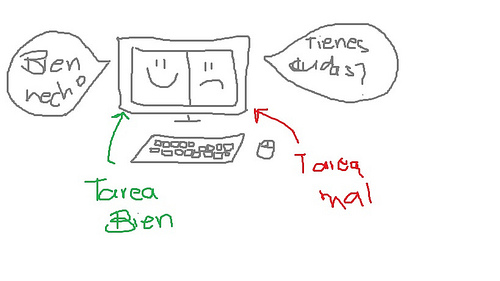“What would you like your computer or the Internet to do that it can’t do right now?”
This morning in the email inbox, wedged in between a press release promoting talent management technology vendor Kenexa's new partnership with leading video interviewing provider Green Job Interview, (kind of interesting), and a blind pitch to run a guest post on my blog about '25 Tech Tools for HR Professionals', (trust me, not at all interesting), came notice of a press release promoting the results of a study titled 'Children's Future Requests For Computers and the Internet' (pdf link). Wish: a computer that gives real-time help and encouragement
Wish: a computer that gives real-time help and encouragement
The study, from the international research consultancy Latitude, was meant to gain insight around potential future technology developments and trends as envisioned by children, and was conducted in 2010. According to the release on the study findings:
(Latitude) asked more than 200 kid innovators, ages 12 and under, from North America, Latin America, Europe, Africa, South Asia, and Australia to submit drawings of something they’d like their computers or the Internet to do differently. Researchers then scored and analyzed kids’ inventions based on the presence of specific, future-oriented technology themes.
As expected the children that participated in the study offered some clever and innovative ideas about their vision of the future capabilities of technology, and in a way, their expectations of the same. As Latitude broke down the findings, (which had to be a bit challenging, since the kids participating in the study were asked to 'draw' their responses), some consistent themes emerged around what these kids hoped for in terms of the evolution of technology and the internet.
To me, the most interesting theme seen in the kids' responses was this - 'Why Aren’t Computers More Human?'.
Again from the Latitude study write-up:
The majority of kids (77%) imagined technologies with more intuitive modes of input (e.g., verbal, gestural, and even telepathic), often capable of human-level responsiveness, suggesting that robots with networking functionality and real-time, natural language processing, could be promising areas of opportunity for companies in education, entertainment, and other industries.
So the a collection of 12-year olds from around the world want systems and technologies that are more responsive, intuitive, natural, and work more with them, in the contexts of the 'real' world in which they live. They want to interact with technology, and have their tools and gadgets react to them in ways that seem very much in tune and in line with their real-life interactions as well. Tactile, verbal, aural - and the ability for technology to recognize and react to the same, these kinds of things we associate with 'real' interaction - are some of the main wish-list items from the study participants.
The funny thing is I bet these are broadly the same kinds of things that most of us adults want from our technologies, whether enterprise level ones, or those we use for fun, utility, or connection in our 'real lives'. Technologies that seem like a natural extension of the way to talk, listen, see, hear, touch, engage, and react. Makes perfect sense that the kids want their computers to seem more human.
In fact I am sure most of us grown-ups want that too.
You can read more about the Latitude study here, and check out some of the drawings that the participating children in the study created on this Flickr set.
What do you think - why aren't computers more human?
Postscript - Ironicially the Kenexa-Green Job Interview partnership I mentioned at the top of the piece is a small step in 'making enterprise systems and processes more 'human'.